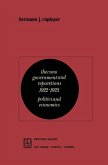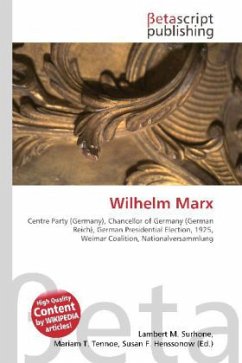Please note that the content of this book primarily consists of articles available from Wikipedia or other free sources online. Wilhelm Carl Josef Cuno (July 2, 1876 - January 3, 1933) was a German politician who was the Chancellor of Germany from 1922 to 1923. He was born in Suhl, Prussian Saxony. Cuno''s government is best known for its passive resistance of the French occupation of the Ruhr Area (1922-1923). Cuno''s government was also responsible for its poor handling of economic problems. In order to pay off the state''s debts, the government under Cuno printed vast amounts of money, leading to hyperinflation which peaked in the summer of 1923. Cuno received education as a lawyer in Berlin and Heidelberg. He was employed by the Reich Treasury Department in 1907. During World War I Cuno was involved in arrangements for food supplies for the German army, but quit civil service to join the Hapag shipping company in 1917. In December 1918 Cuno was promoted to the Hapag''s general director. As an economic expert Cuno participated in the post-war negotiations on reparations and peace terms. The importance of his position as Hapag executive increased after the company became one of the leading shippers of goods between the U.S. and Germany.
Bitte wählen Sie Ihr Anliegen aus.
Rechnungen
Retourenschein anfordern
Bestellstatus
Storno








